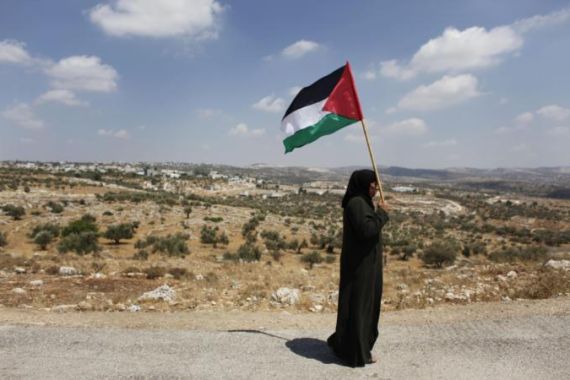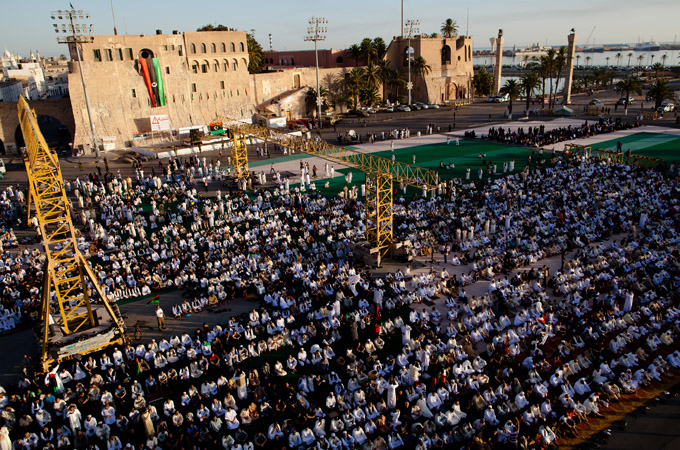The false promise of the nation-state
Emerging nation-states like Libya and Palestine are constrained by local elites integration in socio-economic networks.

 |
| New holders of state power in the global South – even in a rich state like Libya – are profoundly constrained and face limited options [GALLO/GETTY] |
Attention is fixed on Mahmoud Abbas’ application for Palestinian statehood at the United Nations, and on the capture of state power by Libyan rebels. Have we forgotten to ask whether and under what conditions the nation-state is a viable political vehicle for justice and liberation?
A world composed of nation-states is less than seventy years old. Yet the ideal of “national liberation” dominates the political imagination of many oppressed peoples. Such a politics of emancipation has dire limits because serious power is organised and exercised on a global scale.
Before World War II, the world was made up mostly of empires and colonies. A state of their own seemed to promise freedom and recognition to colonised populations. This is because the world of nation-states masquerades as a world of sovereign equals. Each nation-state supposedly rules its own territory and people, free from outside interference.
Only for the others
This was the ideology behind the United Nations, which was conceived and organised by the Western allies during World War II. The war aims of the US and the UK, as expressed in the Atlantic Charter of 1941, included the idea that all “peoples” had a right to self determination. Winston Churchill was quick to claim that this only applied to those in Nazi occupied Europe, not the subject peoples of the British Empire.
But Churchill was a man of the old world. Already the US had pioneered in Latin America and in its “open door” policies towards China modes of intervention and informal rule that recognised the political independence of subordinate states. The diplomatic historian William Appleman Williams used the term “Anticolonial Imperialism” to describe what the US was up to.
Empires always operate in and through some kind of local administration, whether a colonial state, a kept Raja, or an informal relation with a client power. In mature colonies, much of the day to day work of government was carried out by indigenous people, trained up as civil servants, police, and soldiers. Businesses were often operated and even owned by locals.
Occupying such a colony with imperial officials was not only expensive, it caused friction and generated resistance. Why not give local power brokers a somewhat larger cut (but not too large) to run the place for you? The oppressed “nation” could celebrate “independence”, the local elites could enrich themselves, and the imperial power could continue to enjoy the advantages of domination and unequal economic relations.
This was not only empire without colonies, it was an empire that could pose as a supporter of “national liberation”.
The United Nations took this concept of the nation-state to a global level. The world came to be composed mostly of small, relatively weak states, each proudly sovereign and jealous of its prerogatives. But each one also enmeshed in the brutal and shocking disparities of wealth and power that have characterised global politics since the nineteenth century. Local elites prospered, while their people toiled away at subsistence level.
A nation-state organisation of the world offers advantages to those who want to sustain global hierarchies of power. It also poses immense challenges to those struggling for freedom.
The immediate problem is which group or set of interests will seize state power. Colonial borders encased many different peoples within the same territory, and divided others. Colonisation produced sectors of society which benefitted from and were in sympathy with imperial power in varying degrees. The result is intractable and recurring clashes of identity and interest.
These conflicts are evident now in Libya and they have fractured the Palestinian national liberation movement.
“Imagined Community”
Even in Europe, there was no “nation” behind the state to begin with. In myriad ways state power was used to create the “imagined community” of the nation, which often enough was a fiction propagated by a dominant ethnicity or social class.
It is one thing to build a nation-state while rising to world dominance, as in the West. It is quite another to do so when you are on the losing end of global inequities in wealth and power.
New holders of state power in the global South – even in a rich state like Libya – are profoundly constrained and face limited options. Local elites are often deeply enmeshed in economic, cultural and political networks that tie them to foreign powers and interests, Western or otherwise.
The usual outcome is some kind of neo-colony. A local political and economic class benefits from relations with outside powers and global elites, to the neglect of the ordinary people who brought them to power and of their political desires.
Such an arrangement takes many forms. One model is the resource rich country, which can sustain a hyper-wealthy elite, while keeping the masses in check with a combination of repression and bread and circuses. This is the likely fate of Libya, if it does not descend into internal conflict over the possession of state power and its benefits.
Another model is that of South Africa’s Bantustans, “tribal” states that were given limited “independence”. Their function was to outsource security. Like the Palestinian Authority, the Bantustans self-policed a restive population. They also served as a basis for the power and wealth of a local ruling class, connecting it to the larger order that oppressed everyone else.
None of this is to suggest that people seeking liberation should not seek state power. Among other things, the state has the potential to equal the scales between the public good and the private power of capital, foreign or domestic.
But it is to say that the seizure of state power cannot be the end goal of contemporary liberation politics. In the global South, to have a politics only about the nation-state is to play a game with dice loaded against you.
A liberation politics beyond the nation-state would from the beginning reach out to those in other societies struggling also for a just global order. In so much of both the global South and North right now, politics has been reduced to the servicing of narrow interests by cronies holding offices of state.
People around the world are suffering through the nadir of capitalism that is our times. Such circumstances offer possibilities for a local-global politics of liberation.
It is in the global South that liberation movements have the best chance of seizing local state power and its many advantages. At the same time, connections with global struggles for justice will give the free states of the South an international base, a source of power with which to resist becoming a neo-colony.
For it is ultimately only a just global order that long can sustain freedom and equality at home.
Tarak Barkawi is Senior Lecturer in the Centre of International Studies, University of Cambridge.
The views expressed in this article are the author’s own and do not necessarily reflect Al Jazeera’s editorial policy.
